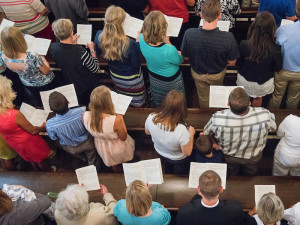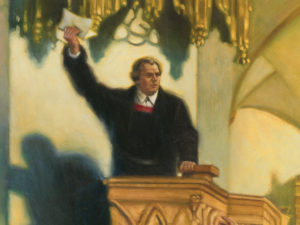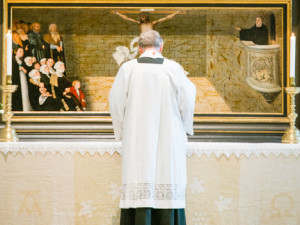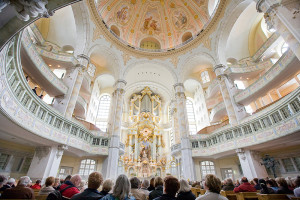by Rev. Dr. Mark Birkholz
 If you want to start an argument among Lutherans, just bring up the topic of worship and the liturgy. Strong opinions exist along the spectrum, from those who would advocate a more casual, informal style of worship with very few traditional elements, to those who insist on following a very specific set of rubrics.
If you want to start an argument among Lutherans, just bring up the topic of worship and the liturgy. Strong opinions exist along the spectrum, from those who would advocate a more casual, informal style of worship with very few traditional elements, to those who insist on following a very specific set of rubrics.
So what was Luther’s preference? Whose side was he on? The difficulty with Luther is that he doesn’t easily fit into one camp or another of the various “worship wars” that have raged for the past half-century or more. So what did Luther actually say and advocate for when it came to worship? Here are a few things to note:
1) Luther didn’t write much on worship per se.
Compared to the extensive writing that Luther did on other topics, he didn’t write a whole lot on worship in the narrow sense—what happens at a Sunday morning service. Luther wrote two orders of worship for the congregation in Wittenberg. The first was for a Latin service written in 1523, and the second was a German order of service, written in 1526. Even these were not orders of service in the sense of detailed instructions, but general guidelines in paragraph form, often with general suggestions and options left open. For example, at one point Luther writes, “[W]e accept the Kyrie eleison [Lord, have mercy] in the form in which it has been used until now, with the various melodies for different seasons, together with the Angelic Hymn, Gloria in Excelsis, which follows it. However, the bishop may decide to omit the latter as often as he wishes.” (AE 53:23)
2) For Luther, the sermon was the central focus of the service.
 In Luther’s mind, the reason why the congregation gathered was to hear the preaching of God’s Word. He wrote, “[A] Christian congregation should never gather together without the preaching of God’s Word and prayer, no matter how briefly. . . . [W]hen God’s Word is not preached, one had better neither sing nor read, or even come together.” (AE 53:11) Luther’s primary concern was with the proclamation of the gospel, and all other liturgical rites and practices were secondary. He often advocated cutting back on the psalms and prayers to give more time and attention to preaching.
In Luther’s mind, the reason why the congregation gathered was to hear the preaching of God’s Word. He wrote, “[A] Christian congregation should never gather together without the preaching of God’s Word and prayer, no matter how briefly. . . . [W]hen God’s Word is not preached, one had better neither sing nor read, or even come together.” (AE 53:11) Luther’s primary concern was with the proclamation of the gospel, and all other liturgical rites and practices were secondary. He often advocated cutting back on the psalms and prayers to give more time and attention to preaching.
3) Luther strongly opposed the sacrificial aspect of the mass.
At the core of Luther’s teaching on the Lord’s Supper was that it is a free gift given to us by God, and not a good work done to earn God’s favor. Luther supported stripping away the prayers that were added to the Word of Institution, known as “the canon of the mass”, to make it clear that this was God’s work and not man’s. Luther refers to this canon as “that abominable concoction drawn from everyone’s sewer and cesspool.” (AE 53:21)
4) Luther was in favor of keeping as much of the service as possible.
 Luther did not advocate writing a new order of service from scratch. Nor did he support a repristination of older forms. Luther took what he had inherited, kept as much as possible, and removed all those elements that he found contrary to the gospel, or that distracted people from the main message. “It is not now nor has been our intention to abolish the liturgical service of God completely, but rather to purify the one that is now in use from the wretched accretions which corrupt it and to point out an evangelical use.” (AE 53:20) Similarly, the Lutheran Confessions state, “Falsely are our churches accused of abolishing the Mass; for the Mass is retained among us, and celebrated with the highest reverence. Nearly all the usual ceremonies are also preserved, save that the parts sung in Latin are interspersed here and there with German hymns, which have been added to teach the people.” (AC XXIV:1-3)
Luther did not advocate writing a new order of service from scratch. Nor did he support a repristination of older forms. Luther took what he had inherited, kept as much as possible, and removed all those elements that he found contrary to the gospel, or that distracted people from the main message. “It is not now nor has been our intention to abolish the liturgical service of God completely, but rather to purify the one that is now in use from the wretched accretions which corrupt it and to point out an evangelical use.” (AE 53:20) Similarly, the Lutheran Confessions state, “Falsely are our churches accused of abolishing the Mass; for the Mass is retained among us, and celebrated with the highest reverence. Nearly all the usual ceremonies are also preserved, save that the parts sung in Latin are interspersed here and there with German hymns, which have been added to teach the people.” (AC XXIV:1-3)
5) Luther did not want to get legalistic about the order of service.
Luther recognized that liturgical forms change over time based on the setting and the needs of each community. He states, “[L]iberty must prevail in these matters and Christians must not be bound by laws and ordinances. That is why the Scriptures prescribe nothing in these matters, but allow for freedom for the Spirit to act according to his own understanding as the respective place, time, and persons may require it.” (AE 53:37) He also wrote, “I would kindly and for God’s sake request all those who see this order of service or desire to follow it: Do not make it a rigid law to bind or entangle anyone’s conscience, but use it in Christian liberty as long, when, where, and how you find it to be practical and useful.” (AE 53:67)
6) Luther encouraged Christian freedom in these matters to be exercised in love.
Even though we have freedom to make changes in these areas, Luther urged restraint in order to preserve unity in the church. “As far as possible, we should observe the same rites and ceremonies, just as all Christians have the same baptism and the same sacrament and no one has received a special one of his own from God.” (AE 53:61) Luther saw consistency in worship forms to be especially useful for training the uneducated and the young.
 Succeeding generations of Lutherans have followed Luther’s orders to a varying degree from time to time and place to place. He did not intend to establish church orders that would never be revised, but to give guidance as the Reformers sought to put the gospel back at the center of worship. Folks are likely to continue the debate over worship for generations to come, and to cite Luther in support of a variety of positions. It is best to listen to Luther in his own words, and to consider his broader goals of promoting worship that would strengthen faith through the proclamation of the gospel.
Succeeding generations of Lutherans have followed Luther’s orders to a varying degree from time to time and place to place. He did not intend to establish church orders that would never be revised, but to give guidance as the Reformers sought to put the gospel back at the center of worship. Folks are likely to continue the debate over worship for generations to come, and to cite Luther in support of a variety of positions. It is best to listen to Luther in his own words, and to consider his broader goals of promoting worship that would strengthen faith through the proclamation of the gospel.
The Rev. Dr. Mark Birkholz is pastor of Faith Evangelical Lutheran Church, Oak Lawn, Ill.
